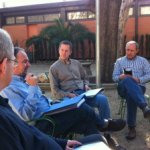There is a lot of emphasis on coaching and facilitating in mission circles today. And rightly so – these are great tools! Teaching often does not get much space at the table though. It seems to escape everyone’s notice that those who advocate coaching and facilitating are in fact teaching.
Teaching is frequently caricatured as only interested in passing on information without much concern for life change. In all my education, I have never met that straw man! I never had a teacher or professor who was only interested in my mastering information. Yes, information was the primary focus of exams, but not exclusively. Even my high school Latin teacher sought to build character as we translated Caesar’s “Gallic Wars.” Throughout college and seminary, my faculty advisors ( and other profs) aimed to build character and a faithful lifestyle. Some were better than others, but all saw their role as developing the whole person. Maybe my education was unique, but I don’t think so. For 35 years, I taught at a Bible College, and none of my colleagues were satisfied with simply passing on information. Teaching gets a bad rap when it is portrayed as simply passing along information.
Now don’t get me wrong; coaching, facilitating, and discovery Bible studies are essential in our missionary task. I practice all of them. But teaching must also have a place at the table. I would say that coaching, facilitating, and discovery are essential techniques of good teaching. Teaching connects the life of the learner to the subject matter. Kevin Vanhoozer quotes Stanley Woodforth:
The joy of teaching lies not in one’s own enthusiasm for the students, or even for the subject matter, but rather for the privilege of introducing the one to the other.
Introducing the subject matter to the student involves information. That does not necessarily mean lecturing , though lecturing is the quickest way to deliver new information (I have heard lectures on coaching and facilitating!). While lecturing may be efficient in delivering information, it tends to be weak on the receiving end of things and this is where facilitation and discussion can strengthen the learning.
I have heard it said that “education is the practice of information passing from the professor’s notes to the students’ notes without passing through the mind of either.” That is sheer cynicism! But even if the information went through the mind of both, that would not be good teaching and that would not be the kind of teaching required in disciplemaking. Biblical disciplemaking requires teaching that informs the mind, impassions the heart, and changes behavior. Information is necessary for learning or we are simply recycling our own prejudice and not growing. But good teaching doesn’t stop with engaging the mind. It engages the heart, and then the hands and feet as well.
I am planning 6 posts in this series on the following issues:
- The Holy Spirit as teacher works with and through the human teacher.
- The New Testament gift of teaching.
- Context is important: The Bible storyline.
- Worldview and interpreting the Bible.
- The complementarity of teaching and facilitating.
- The necessity of teaching.






